Lawsuit Against Ozempic for Stomach Paralysis
- Last Updated: June 12th, 2025

Attorney Jessica Paluch-Hoerman, founder of TruLaw, has over 28 years of experience as a personal injury and mass tort attorney, and previously worked as an international tax attorney at Deloitte. Jessie collaborates with attorneys nationwide — enabling her to share reliable, up-to-date legal information with our readers.
Legally Reviewed
This article has been written and reviewed for legal accuracy and clarity by the team of writers and legal experts at TruLaw and is as accurate as possible. This content should not be taken as legal advice from an attorney. If you would like to learn more about our owner and experienced injury lawyer, Jessie Paluch, you can do so here.
Fact-Checked
TruLaw does everything possible to make sure the information in this article is up to date and accurate. If you need specific legal advice about your case, contact us by using the chat on the bottom of this page. This article should not be taken as advice from an attorney.
Key takeaways:
- Ozempic, made by Novo Nordisk, is linked to severe gastroparesis or stomach paralysis.
- Lawsuits focus on whether Ozempic's side effects were properly disclosed.
- The drug's long - term effects are under scrutiny as more people report health issues.
Overview of Lawsuit Against Ozempic [2025 Update]
On this page, we’ll discuss an overview of the lawsuit against Ozempic, drug manufacturer Novo Nordisk’s response to Ozempic lawsuits, who qualifies for filing an Ozempic Lawsuit, and much more.
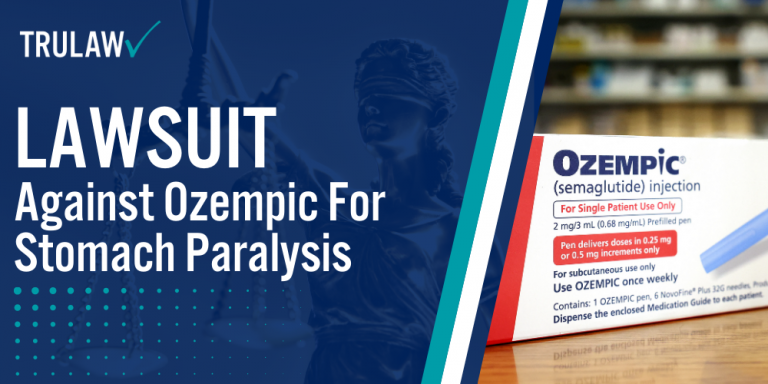
Intro to Lawsuit Against Ozempic
Gastroparesis, commonly referred to as stomach paralysis, is a condition where the stomach cannot empty itself of food in a normal fashion.
Key points to note about the lawsuit include:
- Gastroparesis is allegedly linked to the use of Ozempic, leading to a series of lawsuits against the drug’s manufacturer, Novo Nordisk.
- The Ozempic lawsuits claim that Novo Nordisk did not include warnings about the risk of severe gastroparesis in Ozempic’s prescription information.
- Individuals who have experienced severe gastroparesis after taking Ozempic may qualify to file a lawsuit and seek compensation.
If you or a loved one used Ozempic, Wegovy, or compounded versions of the drugs, and subsequently developed serious health conditions, you may be eligible to file an Ozempic Lawsuit claim.
Contact TruLaw for a free consultation using the chat on this page to receive an instant case evaluation.
Table of Contents
Brief Overview of Ozempic
Ozempic, a prescription medication developed by Novo Nordisk, is primarily utilized to control high blood sugar in individuals with type 2 diabetes.
Its active ingredient, semaglutide, functions as a GLP-1 receptor agonist—a type of drug that mimics an incretin hormone to stimulate insulin production in the pancreas.
This effect not only aids in lowering blood glucose levels but also slows gastric emptying and can contribute to weight loss.
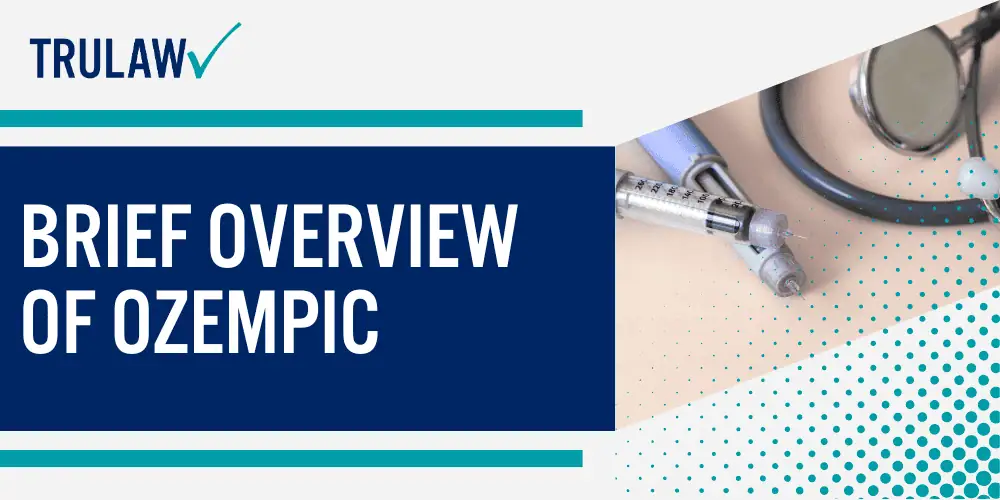
With obesity being a common comorbidity of diabetes, the dual action of Ozempic has positioned it as both a diabetes therapy and a weight management tool.
Despite its therapeutic benefits, scrutiny around Ozempic has intensified due to serious side effects reported by some patients; notable among these is stomach paralysis or severe gastroparesis—an adverse event where the stomach takes longer than normal to empty its contents.
This condition can lead to debilitating symptoms such as nausea and vomiting, ultimately impacting quality of life.
As reports emerge connecting Ozempic usage with this severe gastrointestinal issue, affected patients are seeking compensation through legal channels for what they allege was inadequate warning of potential risks associated with taking this diabetes drug.
The Controversy Surrounding Ozempic
Amid the popularity of Ozempic as a diabetes and weight management medication, concerns have emerged about its link to serious health complications, including severe gastroparesis—a condition marked by stomach paralysis, sparking legal actions from affected patients.
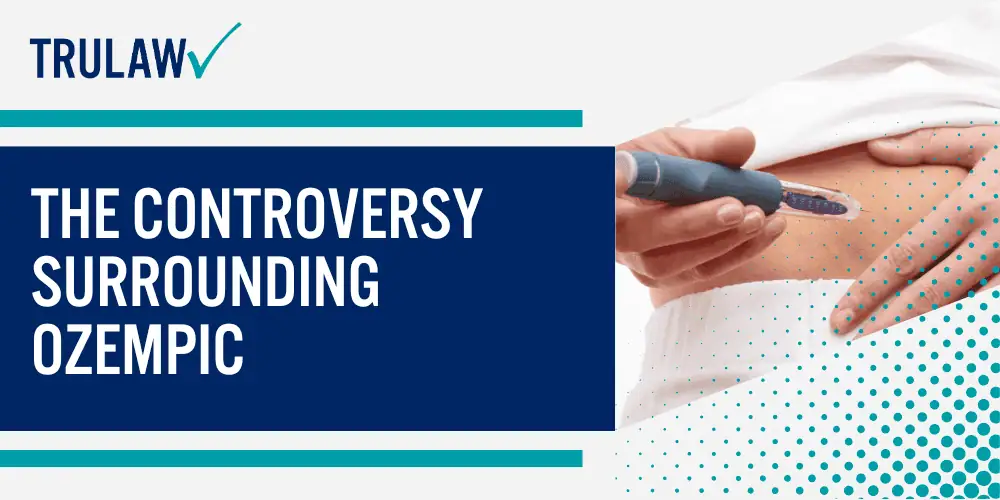
Connection to severe gastroparesis
Ozempic has been linked to severe gastroparesis, which means the stomach takes too long to empty its contents.
This condition can cause serious discomfort and health issues.
Some patients have experienced this slow stomach emptying after taking Ozempic.
They report feeling full quickly, having bloating, and suffering from nausea.
Jaclyn Bjorklund’s lawsuit claims Novo Nordisk didn’t warn her doctors about this risk.
Her case points out that others face similar problems with Ozempic and GLP-1 receptor agonists.
After she filed her claim, more people came forward with their stories of stomach paralysis connected to these drugs.
These reports have raised questions about Ozempic’s safety as a diabetes drug and weight loss aid.
People are looking closely at the side effects now more than ever before.
The lawsuits focus on whether the company provided enough information on the potential for severe gastrointestinal issues like gastroparesis when using Ozempic.
Other reported side effects
People are concerned about Ozempic because it might cause serious side effects.
Some users of the drug have reported worrying health problems.
- Pancreatitis is a painful swelling of the pancreas that can be dangerous.
- Thyroid tumors, including cancer, have been linked to Ozempic.
- Serious allergic reactions can happen and may need urgent medical help.
- Rapid heart rate might occur and could be a sign of a serious condition.
- Vision changes can be alarming and require immediate attention from a doctor.
- Stomach pain has been reported, which could indicate severe issues like gastroparesis.
- Kidney problems, such as kidney failure, have been experienced by some patients.
- Gallbladder issues, including gallstones and inflammation, might develop during treatment.
- Other severe health conditions
The Science Behind the Claims
As plaintiffs come forward with allegations of Ozempic-related gastroparesis, a critical examination of scientific studies is imperative to understand the validity of these claims and what they might mean for users of this diabetes medication.

Studies linking Ozempic to gastroparesis
Doctors and scientists have researched Ozempic and found a worrying connection.
Their studies show that the drug can lead to gastroparesis, where the stomach stops moving food properly.
This condition means your stomach takes too long to empty, which can cause serious issues.
People taking Ozempic for diabetes or weight loss reported feeling sick because of this delayed stomach emptying.
The evidence was strong enough to spark legal actions against Novo Nordisk, the company that makes Ozempic.
Many who suffered from gastroparesis after using Ozempic are now seeking justice through ozempic lawsuits.
These findings about gastroparesis are critical for patients considering Ozempic.
Understanding these risks helps people make informed choices about their health care options.
If faced with similar symptoms, one should talk to their doctor right away and possibly seek legal advice from a place like TruLaw if needed.
Potential long-term effects of Ozempic
Ozempic may have long-term effects that worry some users.
The drug is meant to treat Type 2 diabetes, but reports suggest it could cause stomach paralysis in certain people.
This condition is also known as gastroparesis and means the stomach takes too long to empty its contents.
Some patients experience severe symptoms from gastroparesis, such as nausea, vomiting, and abdominal pain.
Ozempic’s warning label mentions risks of thyroid tumors.
Users are concerned about these serious conditions and what they might mean for their health over time.
Researchers continue to study Ozempic and its side effects.
They want to learn more about how it affects the body after long use.
Patients taking this medication should talk with their doctors about any concerns or unusual symptoms they have.
It’s important for them to stay informed about any new findings related to Ozempic’s safety.
Ozempic Lawsuits: An In-Depth Look
The legal landscape surrounding Ozempic has been evolving, with multiple lawsuits alleging the drug caused severe gastrointestinal problems like stomach paralysis.
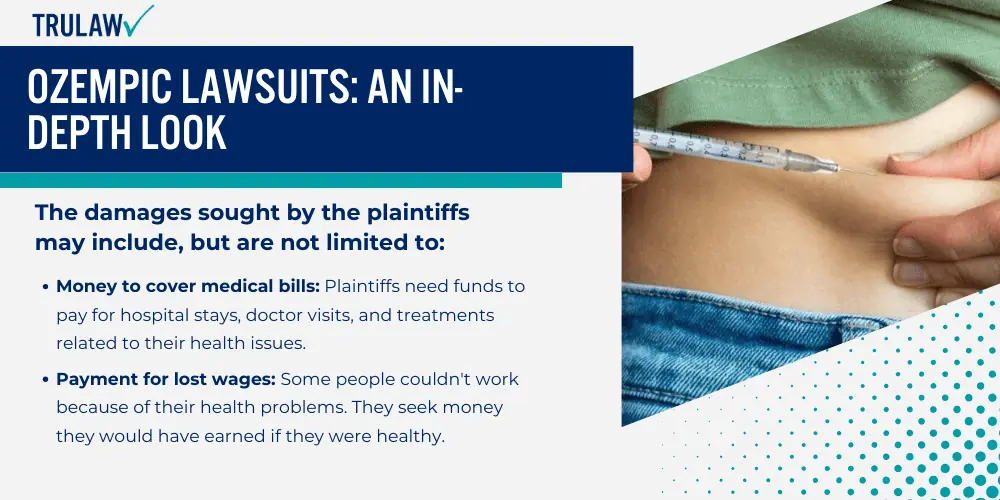
Plaintiffs are coming forward to hold Novo Nordisk accountable for the damage they claim was caused by this diabetes medication, potentially marking a significant shift in how these cases are handled and resolved.
Allegations in lawsuits
People who took Ozempic are suing the drug makers.
They say Ozempic caused stomach paralysis, or gastroparesis.
This condition slows down digestion and can be very painful.
Lawsuits claim that Novo Nordisk did not tell doctors about this risk.
Jaclyn Bjorklund’s case is one example.
She had severe vomiting and pain because of Ozempic.
She even ended up in the hospital and lost teeth.
Jaclyn Bjorklund’s lawsuit states Novo Nordisk hid the risks of taking Ozempic.
It also says Eli Lilly’s Mounjaro has similar issues but claims both companies don’t agree with her case.
Since her lawsuit started, almost 20 more cases have been filed against these companies over drugs like Ozempic – GLP-1 receptor agonists.
Damages sought by plaintiffs
People who file an Ozempic lawsuit often look for compensation.
They want money for the harms they say Ozempic caused.
The damages sought by the plaintiffs may include, but are not limited to:
- Money to cover medical bills: Plaintiffs need funds to pay for hospital stays, doctor visits, and treatments related to their health issues.
- Payment for lost wages: Some people couldn’t work because of their health problems. They seek money they would have earned if they were healthy.
- Compensation for pain and suffering: Suffering from health issues can cause a lot of physical pain and emotional stress. Plaintiffs request payment for this hardship.
- Punitive damages: If a company is found to have acted very wrongly, the court may make them pay extra as punishment.
- Costs of lawyers and courts: When somebody sues, they must spend money on legal help and court fees. They want these costs paid back.
Novo Nordisk’s Response to Lawsuits
In the wake of lawsuits alleging that Ozempic causes stomach paralysis, Novo Nordisk stands by their product’s safety profile, asserting a commitment to patient health while vigorously defending against these claims.
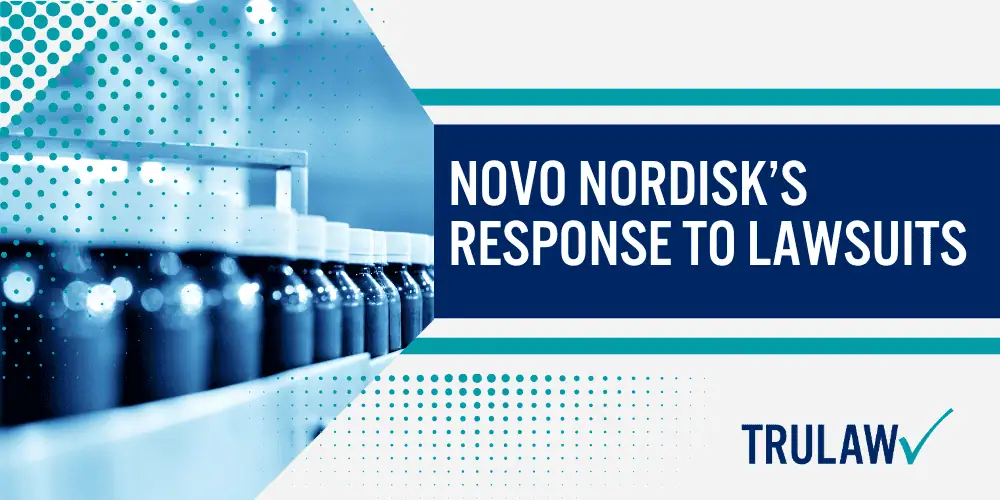
The pharmaceutical giant emphasizes rigorous testing and FDA approval processes, suggesting that any legal challenges fail to recognize the drug’s benefits and overall safety record when used as directed.
Defense strategies
Novo Nordisk plans to defend Ozempic strongly in court.
They might say they told people well about the risks of taking the drug.
The benefits could be more important than the risks for most who use it.
Lawyers for Novo Nordisk may also challenge how the studies link Ozempic to stomach paralysis.
They will look closely at whether Ozempic really caused these health problems.
The company’s defense could point out that other things in a patient’s life may have led to their health issues, not just Ozempic.
They would show that Ozempic passed many tests and rules before doctors started giving it to patients.
This is meant to prove that they did everything right by law.
Novo Nordisk believes in the good impact Ozempic has on those with type 2 diabetes despite legal troubles.
Their legal team might work hard to keep up trust in their products while managing lawsuit challenges behind closed doors.
They may choose to settle some lawsuits privately instead of going through long public trials, but without admitting they did anything wrong.
To keep customers’ trust, they might also step up talks with the public about their drugs.
Counterfeit Ozempic concerns
Fake Ozempic is a big problem.
People are getting sick from it.
This fake medicine can cause stomachs to stop moving food the way they should.
When that happens, it’s called stomach paralysis and it’s very serious.
Lawyers are taking action because of these dangerous fakes.
They want to make sure people get safe medicine.
The lawsuits say the fake Ozempic hurt people and they need help to deal with their health problems caused by using the wrong drug.
It shows why we must be careful about where our medicines come from.
Eligibility Criteria for Filing an Ozempic Lawsuit
If you took Ozempic and suffered severe side effects, you might be able to join a lawsuit.
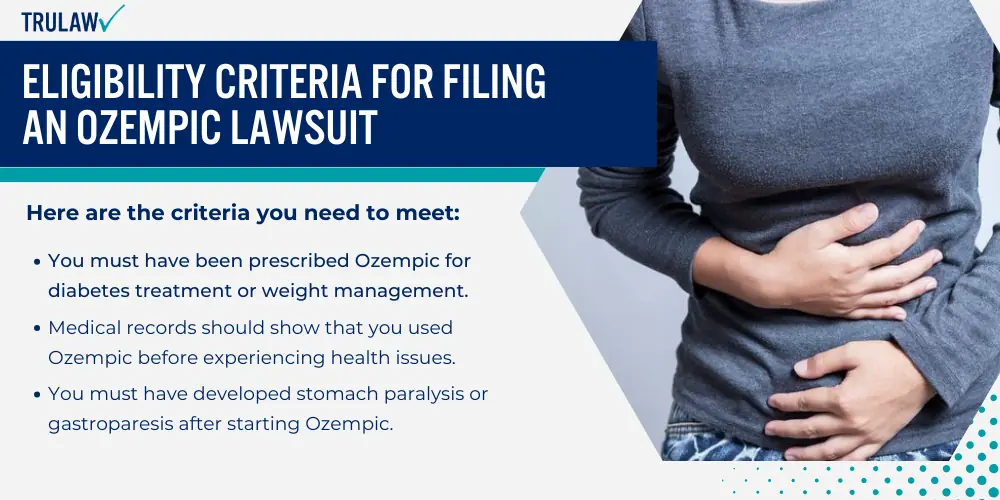
Here are the criteria you need to meet:
- You must have been prescribed Ozempic for diabetes treatment or weight management.
- Medical records should show that you used Ozempic before experiencing health issues.
- You must have developed stomach paralysis or gastroparesis after starting Ozempic.
- Doctors’ reports or hospital records must link your condition to the drug.
- The side effects should have caused significant harm, such as emergency room visits or missed work.
- You haven’t passed the statute of limitations for filing a drug injury claim in your state.
- If you experienced other serious side effects like bowel obstruction or gallbladder disease, those could qualify too.
- Proof is needed that Novo Nordisk’s warnings did not clearly inform about these risks.
The Role of Legal Representation in Ozempic Lawsuits
The role of legal representation is pivotal in Ozempic lawsuits, where skilled attorneys uphold the rights of those affected, guiding them through the intricate legal processes toward just compensation.
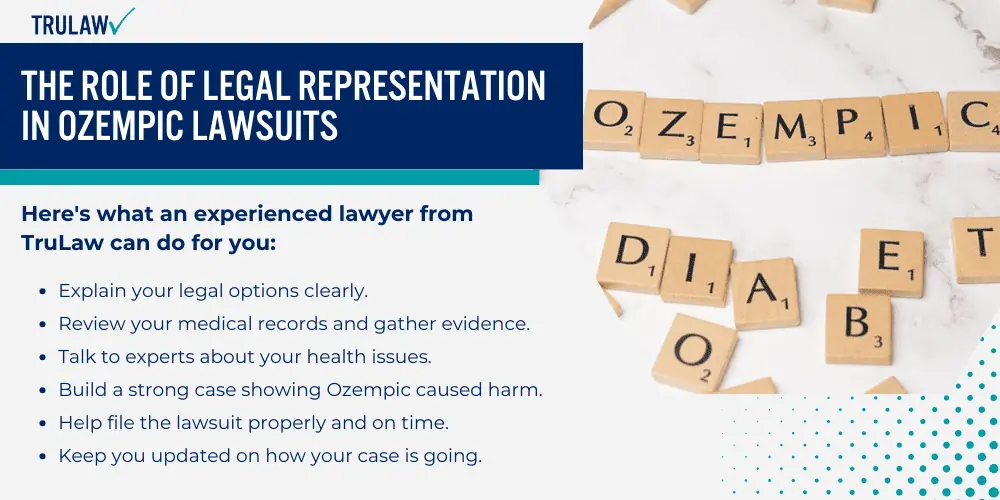
Choosing the right lawyer
Finding a good lawyer matters.
If you think Ozempic harmed you, look for an attorney with experience in drug-related lawsuits.
TruLaw can help.
Their network of lawyers understands the specifics of cases like yours.
You want someone who knows about weight loss drugs and their side effects.
TruLaw’s website makes it easy to talk to Ozempic attorneys.
Use their chat feature to share your story and find out if you have a case.
They’ve helped over 12,000 people seek justice against harmful medications, earning an A+ rating from the Better Business Bureau for their service.
How a lawyer can assist
Hiring a lawyer can make a big difference in an Ozempic lawsuit.
They work hard to protect your rights and get you the help you need.
Here’s what a lawyer from TruLaw can do for you:
- Explain your legal options clearly.
- Review your medical records and gather evidence.
- Talk to experts about your health issues.
- Build a strong case showing Ozempic caused harm.
- Help file the lawsuit properly and on time.
- Keep you updated on how your case is going.
- Fight for compensation for hospital bills, lost pay, and other costs.
- Push for money to cover pain and suffering caused by Ozempic side effects.
- Demand justice if Ozempic led to long – term health problems or permanent injuries.
- Ensure the paperwork is filled out right and legal rules are followed.
The Future of Ozempic Lawsuits
More people might join Ozempic lawsuits if they suffer from severe side effects like stomach paralysis.
Lawyers could ask to group these cases together in one court.
This is called multidistrict litigation or MDL for short.
An MDL can make the legal process faster for everyone involved.
Courts will look at evidence to decide if Ozempic really caused the health problems.
If judges agree, Novo Nordisk might have to pay people who got sick from their drug.
The amount of money and how it’s shared out will depend on each person’s situation.
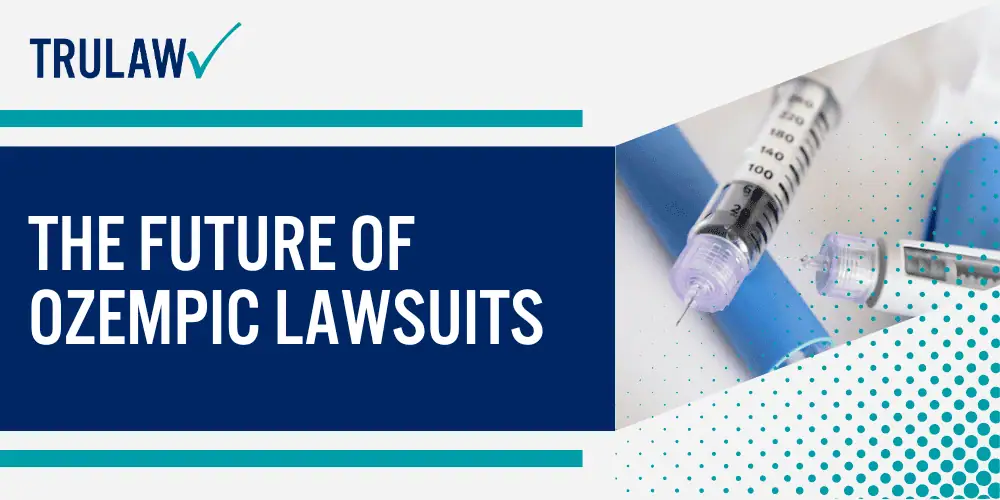
People with worse health issues could get more money.
Drug companies often try to settle these cases outside of court too.
That means they offer money to avoid a trial and any extra bad publicity that comes with it.
But we don’t know yet if this will happen with the Ozempic lawsuits or how much any settlement could be worth.
As time goes on, more facts about Ozempic and its risks may come out during these lawsuits as well.
Conclusion
Ozempic faces tough legal battles over stomach paralysis claims.
Plaintiffs are fighting for compensation after experiencing severe side effects.
Drugmakers stand their ground, insisting warnings were clear.
Yet, with lawsuits mounting, the courts will play a key role in deciding Ozempic’s fate.
People impacted by this medication watch closely as each case unfolds.
Ozempic Lawsuit Frequently Asked Questions
-
A consolidated MDL now exists for lawsuits against multiple GLP-1 drugs, including Ozempic, alleging an increased risk of pancreatitis.
The Ozempic label does mention pancreatitis as a possible side effect, but concerns exist about its emphasis.
Individual lawsuits against Ozempic’s manufacturer, Novo Nordisk, are ongoing, alleging pancreatitis as a side effect.
Contact TruLaw for a free consultation using the chat on this page to receive an instant case evaluation.
-
To find an Ozempic lawyer, you can contact law firms specializing in pharmaceutical and medical lawsuits.
These Ozempic lawyers are experienced in handling cases related to the diabetes drug Ozempic and its side effects.
Contact TruLaw for a free consultation using the chat on this page to receive an instant case evaluation.
They can provide legal guidance and help you understand your rights and potential for compensation.
-
Yes, there are ongoing lawsuits against the manufacturers of Ozempic, Novo Nordisk, regarding claims of stomach paralysis, also known as gastroparesis.
-
Yes, there are ongoing lawsuits against Ozempic alleging a link between the medication and an increased risk of gallbladder problems, including but not limited to:
- Gallstones: Hardened deposits of cholesterol or bile that can cause pain and inflammation.
- Cholecystitis: Inflammation of the gallbladder.
- Cholecystectomy: Surgical removal of the gallbladder.
Contact TruLaw for a free consultation using the chat on this page to receive an instant case evaluation.

Managing Attorney & Owner
With over 25 years of legal experience, Jessica Paluch-Hoerman is an Illinois lawyer, a CPA, and a mother of three. She spent the first decade of her career working as an international tax attorney at Deloitte.
In 2009, Jessie co-founded her own law firm with her husband – which has scaled to over 30 employees since its conception.
In 2016, Jessie founded TruLaw, which allows her to collaborate with attorneys and legal experts across the United States on a daily basis. This hypervaluable network of experts is what enables her to share the most reliable, accurate, and up-to-date legal information with our readers!
Additional Ozempic Lawsuit resources on our website:
Here, at TruLaw, we’re committed to helping victims get the justice they deserve.
Alongside our partner law firms, we have successfully collected over $3 Billion in verdicts and settlements on behalf of injured individuals.
Would you like our help?
At TruLaw, we fiercely combat corporations that endanger individuals’ well-being. If you’ve suffered injuries and believe these well-funded entities should be held accountable, we’re here for you.
With TruLaw, you gain access to successful and seasoned lawyers who maximize your chances of success. Our lawyers invest in you—they do not receive a dime until your lawsuit reaches a successful resolution!
AFFF Lawsuit claims are being filed against manufacturers of aqueous film-forming foam (AFFF), commonly used in firefighting.
Claims allege that companies such as 3M, DuPont, and Tyco Fire Products failed to adequately warn users about the potential dangers of AFFF exposure — including increased risks of various cancers and diseases.
Depo Provera Lawsuit claims are being filed by individuals who allege they developed meningioma (a type of brain tumor) after receiving Depo-Provera birth control injections.
A 2024 study found that women using Depo-Provera for at least 1 year are five times more likely to develop meningioma brain tumors compared to those not using the drug.
Suboxone Tooth Decay Lawsuit claims are being filed against Indivior, the manufacturer of Suboxone, a medication used to treat opioid addiction.
Claims allege that Indivior failed to adequately warn users about the potential dangers of severe tooth decay and dental injuries associated with Suboxone’s sublingual film version.
Social Media Harm Lawsuits are being filed against social media companies for allegedly causing mental health issues in children and teens.
Claims allege that companies like Meta, Google, ByteDance, and Snap designed addictive platforms that led to anxiety, depression, and other mental health issues without adequately warning users or parents.
Transvaginal Mesh Lawsuits are being filed against manufacturers of transvaginal mesh products used to treat pelvic organ prolapse (POP) and stress urinary incontinence (SUI).
Claims allege that companies like Ethicon, C.R. Bard, and Boston Scientific failed to adequately warn about potential dangers — including erosion, pain, and infection.
Bair Hugger Warming Blanket Lawsuits involve claims against 3M — alleging their surgical warming blankets caused severe infections and complications (particularly in hip and knee replacement surgeries).
Plaintiffs claim 3M failed to warn about potential risks — despite knowing about increased risk of deep joint infections since 2011.
Baby Formula NEC Lawsuit claims are being filed against manufacturers of cow’s milk-based baby formula products.
Claims allege that companies like Abbott Laboratories (Similac) and Mead Johnson & Company (Enfamil) failed to warn about the increased risk of necrotizing enterocolitis (NEC) in premature infants.
Here, at TruLaw, we’re committed to helping victims get the justice they deserve.
Alongside our partner law firms, we have successfully collected over $3 Billion in verdicts and settlements on behalf of injured individuals.
Would you like our help?
